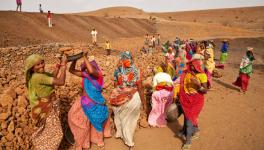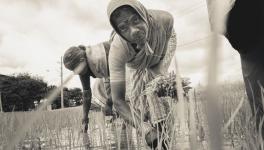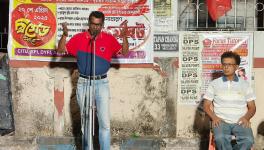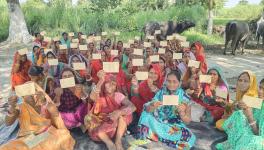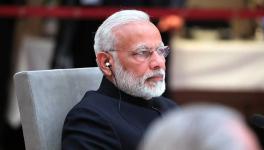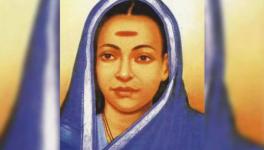‘Guarantee Land Ownership Rights for Women Agricultural and Rural Workers’
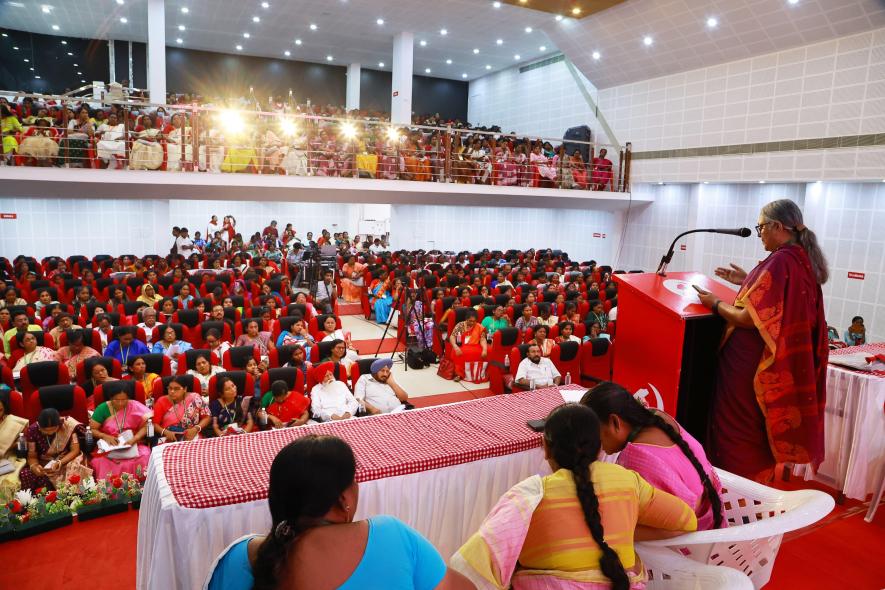
A two-day all-India Convention of Women Agricultural and Rural Workers, organised by All India Agricultural Workers Union, was held in Kerala on May9-10, 2025.
The two-day all-India Convention of Women Agricultural and Rural Workers, organised by All India Agricultural Workers Union (AIAWU), has called for equal wages for equal work for women agricultural and rural workers, a legislation guaranteeing maternity benefits, with the government assuming full responsibility for its implementation, protective gear for women workers engaged in tasks involving hazardous chemicals, pesticides, and herbicides, among other demands.
Inaugurating the convention, held at EMS Academy, Malappuram district of Kerala on May 9-10, 2025, U. Vasuki, vice-president of All Indian Democratic Women’s Association and a member of the CPI(M) polit bureau, highlighted the situation of women agricultural and rural workers in the country, especially as the impact of neoliberal economic policies were forcing rural workers to take up various non-farm jobs
Vasuki said gender-based wage discrimination was a serious issue among agricultural labourers. She also highlighted that the programmes like the rural job guarantee scheme, MGNREGA, which have more participation of female workers, had offered some economic relief, but “neoliberal pressures have eroded its implementation, reducing employment opportunities and threatening the economic security of female workers.”
Outlining the role played by the Left parties in the process of formulating MGNREGA during the United Progressive Alliance–I government, she said, “We should remember that it was the first ever legal guarantee of work in the country with equal wages for both men and women.”
Various parliamentary committees have recommended the strengthening of MGNREGA through higher allocations, wage increase and increase in the number of working days, and against the Adhaar-based payment System.
Vasuki also called upon women workers to fight the BJP-RSS “not just in the fields but also on the ideological level where we counter their Manuwadi Hindutva pro-corporate ideas which is at the root of all evils in society.”
The convention’s draft resolution, placed by Lalitha Balan, underlined the concrete issues of women agricultural and rural workers. According to India’s 2011 Census, women constitute 30.33% (3.6 crore) of cultivators and 42.67% (6.15 crore) of agricultural workers. A large majority (81%) belongs to Scheduled Castes, Scheduled Tribes, or Other Backward Classes, and 83% are landless or come from small and marginal farming families. Social constraints and limited mobility mean fewer women migrate for non-agricultural work, deepening their reliance on agriculture.
It noted that gender-based wage discrimination remained a serious issue among agricultural labourers. While the wage gap between men and women narrowed slightly between 2006–07 and 2013–14, it has widened again since 2014.
“Women are typically employed in tasks that are assigned lower wages, compounding their economic disadvantage. These trends underscore persistent inequities driven by both occupational segregation and direct wage discrimination,” the convention noted.
Additionally, women in India spend about 32% of their time on agricultural tasks, such as transplanting and harvesting, while also devoting around 300 minutes daily to unpaid domestic work such as cooking and caregiving.
Women agricultural workers are largely excluded from maternity benefits, forcing them to work until late stages of pregnancy and return to work shortly after childbirth. With no crèche facilities, children are left with elderly family members or siblings, contributing to high malnutrition rates.
The National Commission on Self-employed Women and Women Workers (NCSEW) stressed that for unorganised sectors, such as agricultural labour, where employers are not identifiable, the state must take responsibility for ensuring universal maternity benefits as provided under the Maternity Benefit Act for women workers. Disturbingly, studies have shown that female sugarcane cutters are sometimes coerced into undergoing hysterectomies to avoid pregnancy and lost work time.
Women workers face multi-layered exploitation. When an agricultural worker is a woman and comes from Dalit or tribal background then the level of exploitation becomes multi-layered. They are exploited as workers and then they have to face social discrimination due to their lower caste and finally they are exploited for being women.
Challenge of Hindutva
The resolution emphasised the challenge posed by the communal hatred spread by Hindutva forces that has deeply penetrated rural society, undermining the unity of the working class and dividing workers along communal lines, against their class interests. Women workers, in particular, have become victims of the propaganda disseminated by the BJP-RSS combine, which is exhibiting increasingly neo-fascist characteristics, it noted.
The ruling BJP, driven by the Manuvadi ideology, views women as inherently inferior to men, reinforcing patriarchal norms and imposing various restrictions on them. Naturally, under such political and ideological conditions, violence and sexual harassment against women, especially rural women workers, are on the rise. Alarmingly, the perpetrators often enjoy protection and patronage from those in power.
The union called for further intensifying the struggle against all forms of discrimination targeting women workers. “We must carry out issue-based interventions on gender matters while simultaneously waging an uncompromising ideological battle against patriarchy. This struggle is essential to counter both the neoliberal agenda and regressive ideas of Manuvadi propagated by Corporate Hindutva forces,” it said.
Seminars on women agricultural and rural workers were part of the convention. Madhura Swaminathan, professor, Indian Statistical Institute, Bengaluru, spoke on ‘The Livelihood Crisis and Gender Wage Gap Among Women Agricultural and Rural Workers’, while advocate C.S. Sujatha, spoke on ‘Contrast Between the Policies of BJP-led Central Government and LDF-led Kerala Government Towards Rural Women.
In the evening of the concluding day, a massive rally and public meeting were held at Perinthalmanna, where the union highlighted its key demands:
- Ensure equal wages for equal work for women agricultural and rural workers. Provide women workers with work of equal nature and value, accompanied by equal pay.
- Enact legislation guaranteeing maternity benefits for women agricultural and rural workers, with the Government assuming full responsibility for its implementation.
- Provide protective gear to women agricultural and rural workers who are engaged in tasks involving hazardous chemicals, pesticides, and herbicides.
- Guarantee land ownership rights for women agricultural and rural workers, along with the provision of adequate housing.
- Ensure better working conditions, including the mandatory establishment of crèche (childcare) facilities at workplaces.
- Strengthen and expand MNREGA to promote greater participation of women agricultural and rural workers.
- Strictly enforce laws (Sexual Harassment of Women at Workplace (Prevention, Prohibition, and Redressal) Act, 2013) to safeguard women against sexual harassment at the workplace. Establish a robust implementation mechanism and special courts to ensure speedy justice for victims.
- Address the additional challenges faced by women migrant workers, especially in areas of housing, sanitation, and social security at their places of work and residence.
- Establish a competent and accessible microfinance system, along with the provision of easy loans at zero interest rates.
- Strengthen the public health system to effectively address the health issues of women agricultural and rural workers. Ensure comprehensive social and economic security (Rs. 6500/month) for women agricultural and rural workers.
- Introduce special provisions for pension and social support for single, deserted, and widowed women workers.
The writer is joint secretary, All India Agricultural Workers Union.
Get the latest reports & analysis with people's perspective on Protests, movements & deep analytical videos, discussions of the current affairs in your Telegram app. Subscribe to NewsClick's Telegram channel & get Real-Time updates on stories, as they get published on our website.











